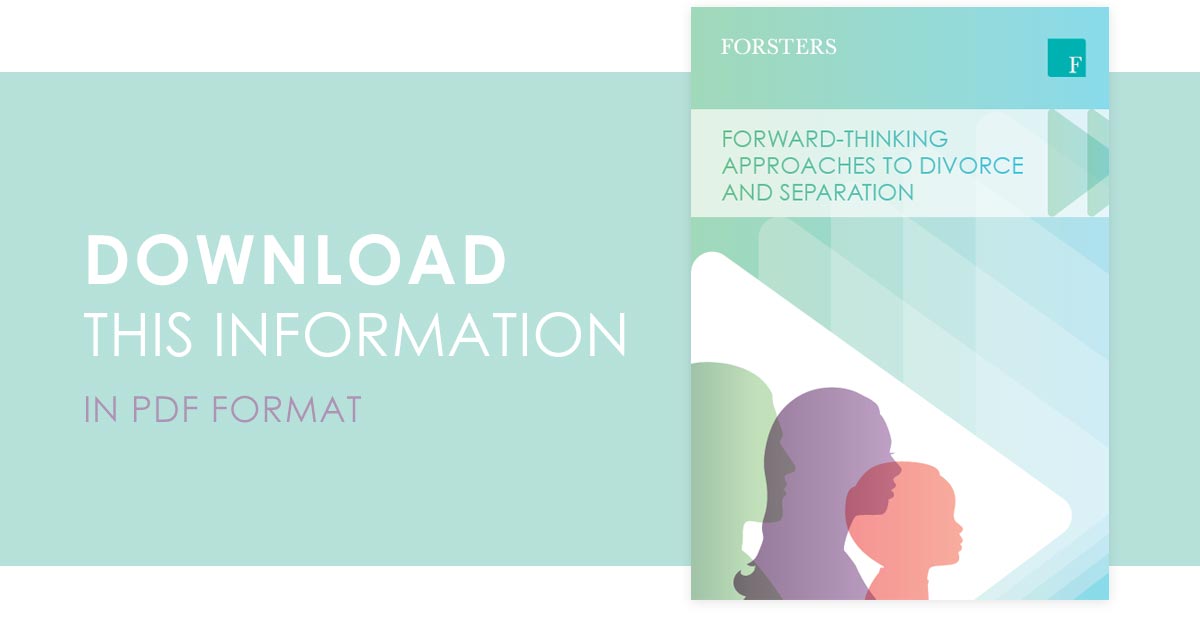Collaborative Practice
In many instances, solicitors are able to assist a couple to reach agreement through negotiation.
The process
Collaborative practice involves both parties and their respective solicitors coming together in a series of face to face meetings to work out an agreement regarding their financial and/or children matters.
At the start of the process everyone signs a ‘participation agreement’, which commits parties to resolving matters without going to court. This means that if the process breaks down, the parties’ solicitors cannot represent them in any future court proceedings. Each party also has the chance to set out their objectives in an ‘anchor statement’. If an agreement is reached it can be embodied in a consent order or parenting plan.
Non-legal professionals are often brought in to assist during the process, such as financial advisors, accountants and family therapists.
Separating couples often choose collaborative practice over solicitor negotiations/round-table meetings as it gives them a greater say in the process and more control of it. The ‘disqualification clause’ in the participation agreement creates a safe space for discussions without the threat of court.
Suitable circumstances
The focus of the process is on the whole family and keeping future-focused, rather than dwelling on the past. It can be especially useful in resolving arrangements for children, where couples wish to co-parent.
Collaborative practice is particularly suited to separating couples:
- who wish to create an agreement on their own terms, as opposed to a third party imposing a decision
- who feel comfortable discussing issues directly with each other, albeit with the support of their solicitors
- where there is a significant degree of trust for example each party must be confident that the other has fully disclosed their finances (or will do so)
- in complex cases, where technical legal (or nonlegal) advice is required, as this can be provided by the parties’ solicitors (and other professionals) during the process and shared with everyone.
If there are discrete issues, e.g. relating to the children arrangements, that the couple wish to discuss without solicitors, they could discuss these through mediation. Alternatively, in higher conflict cases, a mediator can even be brought into the collaborative process in a ‘five-way’ meeting. If discrete issues are not capable of being resolved, they may be referred to arbitration.
Benefits
- Privacy – the venue can be far more discreet than a busy court building.
- On your terms – both parties are directly involved in the discussions whilst also being supported by their solicitor. As a result they often feel empowered and more positive moving forward.
- Improved communication – the collaborative process can enable clients to improve their communication with one another, which can be particularly beneficial where they need to continue working together as co-parents.
- Work at your pace – as the process is not driven by a court timetable, it can move at the required pace of the parties’ needs and priorities.
- Open advice – because collaborative practice is all about the sharing of advice and non-positional discussions, there is less ‘posturing’ and common ground tends to be identified more quickly.
Our insight
In order for the collaborative process to be successful, both parties need to be committed to working out a solution away from court and prepared to invest the time and energy into doing so, as the meetings can be labour and time-intensive.
It is the process with which most separating couples have expressed satisfaction.
CASE STUDY
A couple had separated due to the husband’s affair but maintained a civil relationship in order to coparent effectively. There were a number of complex issues to resolve relating to the valuation of the husband’s business in order to settle the financial arrangements. The wife was also still dealing with the emotional aspects of the husband’s affair.
Whilst the couple wanted to find a solution that avoided court, the wife in particular, wished to have the support of her solicitor in discussions. Collaborative practice enabled the couple to agree a financial settlement after five meetings, where we supported them. During the process an accountant and family therapist attended some of the meetings to assist.
When the collaborative process succeeds (which the vast majority do), separating couples are typically highly satisfied with the outcome, as they have played a central role in achieving a resolution, whilst maintaining amicable relations with the other party.
Arbitration
Arbitration involves the separating couple appointing a family arbitrator - a practising barrister, solicitor or retired judge - to make a decision on their financial and/or some children matters.



